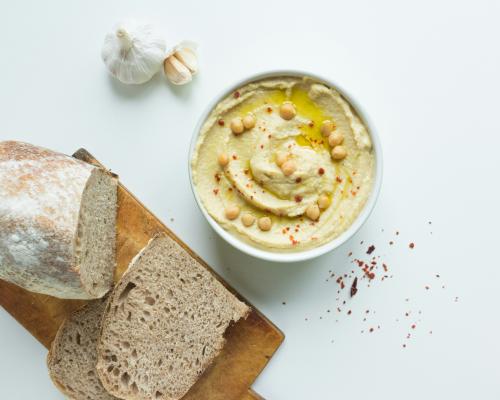Is Hummus Healthy? A Dietician's Analysis and Advice

Is Hummus Healthy? A Dietician's Analysis and Advice
Hummus has become healthful and diverse in recent years. Hummus is famous, but does it have hidden health risks? For the reality behind its reputation, let's study its nutrition.
Nutritional Profile of Hummus
Hummus primarily comprises chickpeas (garbanzo beans), tahini (sesame seed paste), olive oil, lemon juice, and garlic.
Together, these ingredients offer a balanced blend of macronutrients and micronutrients:
- Protein: Chickpeas are a rich source of plant-based protein, providing essential amino acids necessary for various bodily functions.
- Fiber: High fiber in chickpeas and tahini supports digestive health, promotes satiety, and regulates blood sugar levels.
- Healthy Fats: Olive oil and tahini contribute heart-healthy monounsaturated fats, which help reduce LDL cholesterol levels and support overall cardiovascular health.
- Vitamins and Minerals: Hummus contains essential nutrients such as folate, iron, manganese, copper, and calcium, contributing to overall well-being.
Is Hummus Healthy for Weight Loss?
Despite its relatively high caloric content, hummus can be a valuable addition to a weight loss diet. Combining protein and fiber in chickpeas and tahini promotes satiety and helps control appetite, potentially reducing overall calorie intake. However, moderation is vital, as excessive consumption may lead to a calorie surplus and hinder weight loss efforts.
Addressing Common Concerns
Is Hummus Fattening or Good for You?
While hummus contains fats, they are primarily heart-healthy monounsaturated fats from olive oil and tahini. When consumed in moderation as part of a balanced diet, hummus can support weight loss goals rather than hinder them.
Is it Okay to Eat Hummus Every Day?
While hummus is a nutritious snack, it should be enjoyed in moderation. Incorporating hummus into your daily diet can provide valuable nutrients, but avoid excessive consumption to maintain dietary balance.
Can I Eat Hummus While Trying to Lose Weight?
Yes, hummus can be a beneficial addition to a weight-loss diet. Its high protein and fiber content promotes satiety, helping control appetite and calorie intake, essential for successful weight loss.
Is Hummus Full of Sugar?
Most commercially available hummus varieties contain minimal to no added sugar. The natural sweetness of chickpeas and the savory flavors from tahini and olive oil make hummus a wholesome and nutritious choice.
Is Hummus a Bad Carb?
Hummus primarily consists of complex carbohydrates from chickpeas, which are digested slowly and provide sustained energy. However, be cautious of store-bought options with added sugars or preservatives, which may diminish their nutritional value.
Conclusion
In conclusion, hummus is a nutritious and versatile food that can be part of a healthy diet. Its rich nutritional profile, including protein, fiber, healthy fats, vitamins, and minerals, offers numerous health benefits. However, mindful consumption and attention to ingredient quality are essential to reap the full advantages of this beloved dip. Incorporate hummus into your meals and snacks in moderation to enjoy its delicious taste and nutritional benefits without compromising your health goals.
About the Author:
Meet Joseph Emb, RDN, a Registered Dietitian Nutritionist. Through StyleVitally.com, he provides expert insights on healthy eating, diet, and fitness. Joseph's goal is to help people make informed nutrition decisions. His articles cover various culinary topics and discuss the health effects of different foods.
Post Your Ad Here
Comments